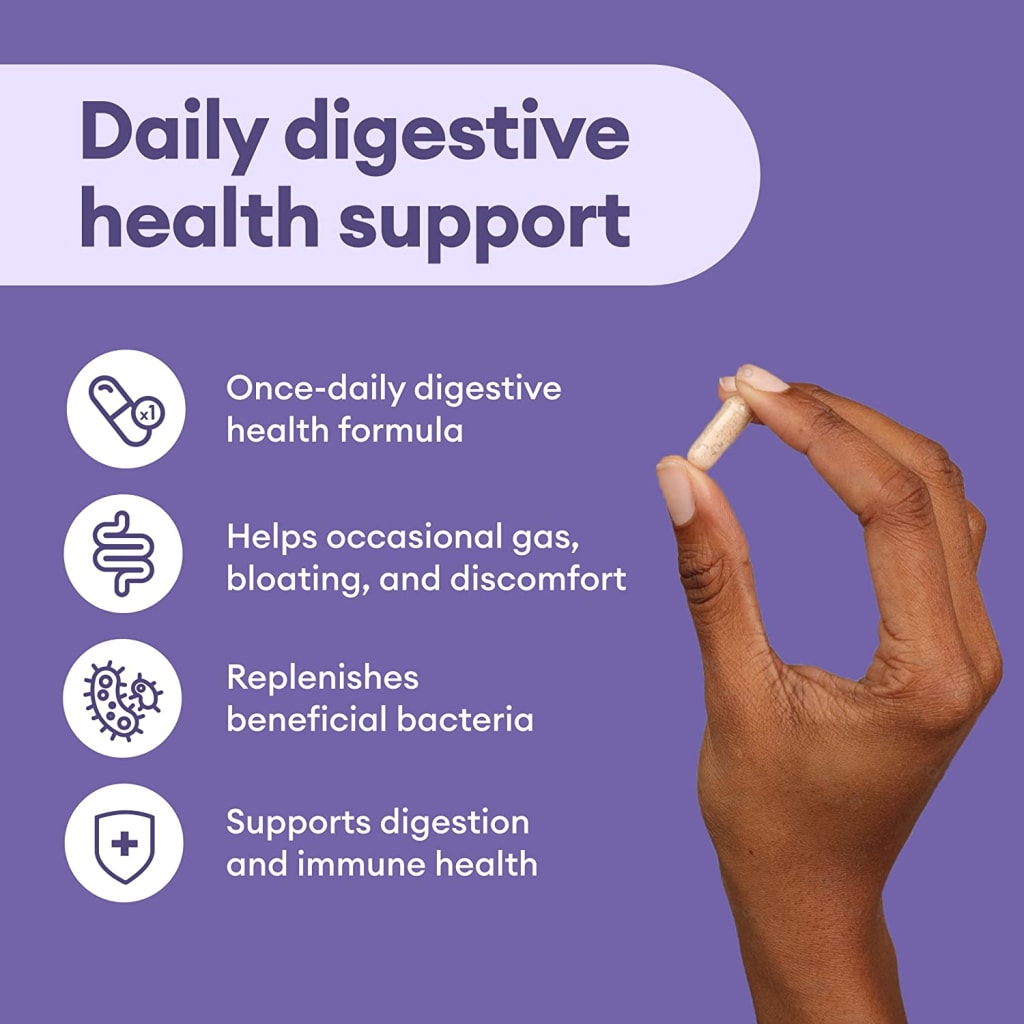The Power of Probiotics
Health Benefits, Signs, Safety, and Risks

Physician's CHOICE https://amzn.to/40UVZ2n
Probiotics, live microorganisms that offer health benefits when consumed in adequate amounts, have gained significant attention in recent years. They play a crucial role in maintaining the balance of our gut microbiota, which in turn affects our overall health and well-being. As scientific research continues to explore the potential benefits of probiotics, it becomes increasingly important for consumers to understand what probiotics are good for and how they can be incorporated into a healthy lifestyle.
I. Gastrointestinal Health
One of the most well-known benefits of probiotics is their positive impact on gastrointestinal health. They have been shown to help alleviate several common digestive issues, including:
Antibiotic-associated diarrhea: Probiotics can help restore the balance of gut bacteria disrupted by antibiotic use, reducing the incidence and severity of antibiotic-associated diarrhea.
Inflammatory bowel disease (IBD): Some studies suggest that certain probiotic strains may help induce and maintain remission in patients with ulcerative colitis, a type of IBD.
Irritable bowel syndrome (IBS): Probiotics may help reduce the symptoms of IBS, such as abdominal pain, bloating, and irregular bowel movements, although the specific strains and dosages that are most effective are still being researched.
II. Immune System Support
Probiotics can also support a healthy immune system in various ways:
Immune function and infections: Some strains of probiotics may enhance immune function by increasing the production of immune cells and improving their ability to fight off pathogens.
Allergies: Limited evidence suggests that probiotics may help reduce the risk of eczema in infants and possibly alleviate symptoms in those with milk allergies.
III. Women's Health
Probiotics have shown promise in addressing certain women's health issues, including:
Bacterial vaginosis: Some studies suggest that probiotics, especially Lactobacillus strains, can help restore a healthy balance of vaginal bacteria, reducing the risk of bacterial vaginosis.
Urinary tract health: While more research is needed, limited evidence indicates that probiotics may be beneficial in managing urinary tract infections by promoting the growth of beneficial bacteria and inhibiting the growth of harmful bacteria.
IV. Mental Health
Emerging research has revealed a potential link between the gut microbiota and mental health. Some studies have found that:
Depression and anxiety: Probiotics may have a small positive effect on reducing symptoms of depression and anxiety, although more research is needed to confirm these findings and determine the most effective strains and dosages.
V. Other Potential Benefits
Probiotics may offer additional health benefits, such as:
Cholesterol: Some research suggests that probiotics can help lower total and LDL (bad) cholesterol levels, although the effect is typically modest.
Blood pressure: Limited evidence indicates a possible link between high blood pressure and gut microbiota, but more research is needed to establish a clear relationship.
Glycemic control: Probiotics supplementation has been shown to improve glucose homeostasis, which could have implications for managing blood sugar levels in individuals with diabetes or metabolic syndrome.
Probiotics offer a range of potential health benefits, from supporting gastrointestinal and immune health to promoting women's health and mental well-being. As research continues to uncover the full extent of these benefits, it becomes increasingly important for individuals to understand how to choose and incorporate probiotics into their daily routine. By doing so, they can harness the power of these beneficial microorganisms to improve their overall health and well-being.
Taking Probiotics Daily
With growing awareness of the potential health benefits of probiotics, as discussed, many people are considering incorporating them into their daily routines. One common question that arises is whether it is safe to take a probiotic every day. This article will explore the safety and potential benefits of daily probiotic use, as well as any potential risks and concerns.
I. General Safety of Probiotics
For the majority of healthy individuals, taking a probiotic every day is considered safe. Probiotics are naturally found in various foods, such as yogurt, kefir, and other fermented products, and have been consumed by humans for centuries without significant issues. However, there are some situations and populations where caution is advised:
Immunocompromised individuals: Those with weakened immune systems, such as people with HIV/AIDS, undergoing chemotherapy, or taking immunosuppressive medications, should consult their healthcare provider before using probiotics, as they may be at a higher risk of developing infections.
Critically ill patients: People who are critically ill or have recently undergone surgery should use caution with probiotics, as they may be more susceptible to infections and complications.
Infants and young children: While some probiotics may be safe for infants and young children, parents should consult a pediatrician before introducing probiotics to their child's routine.
II. Potential Benefits of Daily Probiotic Use
Taking a probiotic every day may offer several health benefits:
Maintaining a healthy gut microbiota: Daily probiotic consumption can help keep your gut bacteria balanced, promoting overall digestive health and potentially reducing the risk of gastrointestinal disorders.
Enhancing immune function: Regular probiotic intake can support immune health by modulating the immune response and promoting a healthy balance of beneficial microorganisms.
Mental well-being: Some evidence suggests that daily probiotic use may help improve mood and alleviate symptoms of depression and anxiety.
Women's health: Regular probiotic intake may help prevent recurrent bacterial vaginosis and urinary tract infections.
III. Potential Risks and Concerns
While taking a probiotic every day is generally considered safe, there are a few potential risks and concerns:
Overuse and potential side effects: Overusing probiotics may lead to side effects such as bloating, gas, or an upset stomach. It is essential to follow the recommended dosage and consult with a healthcare professional if side effects persist.
Interactions with medications: Probiotics may interact with certain medications, such as antibiotics or immunosuppressants. Consult your healthcare provider before starting probiotics if you are on any medications.
Quality control: The quality of probiotic supplements can vary widely, so it is crucial to choose a reputable brand that has been tested for purity, potency, and safety.
For most healthy individuals, taking a probiotic every day is considered safe and may offer numerous health benefits. However, it is essential to consider potential risks and consult with a healthcare professional before starting a daily probiotic regimen, particularly for those with compromised immune systems, serious medical conditions, or young children. By selecting a high-quality probiotic and following the recommended dosage, you can maximize the potential benefits of daily probiotic use for your overall health and well-being.
When to Avoid Probiotics
While we have highlighted the numerous health benefits and safety of daily probiotic use for the majority of individuals, there are certain populations who should exercise caution or avoid probiotics altogether. This article will identify the groups of people who may be at risk and explain why probiotics may not be suitable for them.
I. Immunocompromised Individuals
People with weakened immune systems, such as those with HIV/AIDS, undergoing chemotherapy, or taking immunosuppressive medications, should consult their healthcare provider before using probiotics. They may be at a higher risk of developing infections from live bacteria present in probiotic supplements or foods, which could lead to serious complications.
II. Critically Ill Patients
Critically ill patients or those who have recently undergone surgery should use caution with probiotics. The risk of infection and complications may be higher in these individuals due to their compromised health status. It is crucial to consult a healthcare professional before introducing probiotics during recovery from critical illness or surgery.
III. Infants and Young Children
While some probiotics may be safe for infants and young children, parents should consult a pediatrician before introducing probiotics to their child's routine. The safety and efficacy of probiotics can vary depending on the child's age, health status, and the specific probiotic strain.
IV. People with Short Bowel Syndrome
Individuals with short bowel syndrome, a condition where a significant portion of the small intestine is missing or non-functional, may be at a higher risk of bacterial overgrowth and complications from probiotics. Consult a healthcare provider before using probiotics if you have short bowel syndrome.
V. Individuals with Allergies to Probiotic Sources
Some people may have allergies to the ingredients or sources of probiotics, such as dairy products or soy. If you have a known allergy to the source of a probiotic, it is essential to avoid that particular product and seek an alternative that does not trigger an allergic reaction.
VI. People Taking Certain Medications
Probiotics may interact with certain medications, such as antibiotics, antifungal medications, or immunosuppressants. Consult your healthcare provider before starting probiotics if you are on any of these medications, as they may alter the effectiveness of the medication or lead to adverse reactions.
While probiotics can offer numerous health benefits to many people, there are certain populations who should exercise caution or avoid them altogether. It is crucial to consult with a healthcare professional before starting a probiotic regimen if you fall into one of the categories mentioned above. By considering potential risks and seeking professional guidance, you can make informed decisions about probiotic use and ensure the safety and well-being of yourself and your loved ones.
About the Creator
Aiden Westwood
Aiden Westwood is a passionate blogger, lifestyle enthusiast, & content creator, with a keen eye for the latest trends. From travel to wellness, Aiden's blog covers a wide range of engaging subjects to captivate and inspire readers.






Comments
There are no comments for this story
Be the first to respond and start the conversation.